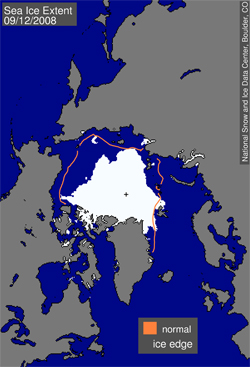Arctic sea ice “likely” hit lowest volume on record in 2008
mongabay.com
October 3, 2008
|
|
The volume of sea ice in the Arctic has likely hit its lowest level since satellite measurements began in 1979, report researchers at the University of Colorado at Boulder’s National Snow and Ice Data Center, who confirmed that Arctic sea ice extent was the second-lowest on record this year.
“Preliminary data indicate that 2008 probably represents the lowest volume of Arctic sea ice on record, partly because less multiyear ice is surviving now and the remaining ice is so thin,” said CU-Boulder Research Associate Walt Meier, a research scientist at NSIDC/
Average sea ice extent during September was 1.8 million square miles, just 9 percent above last year’s record low of 1.65 million square miles and 34 percent below the long-term average from 1979 to 2000.
The researchers say the 2008 low “strongly reinforces the 30-year downward trend in Arctic sea ice extent”.
 Arctic sea ice extent for September 12, 2008, was 4.52 million square kilometers (1.74 million square miles). The orange line shows the 1979 to 2000 average extent for that day. The black cross indicates the geographic North Pole. Sea Ice Index data. Credit: National Snow and Ice Data Center |
“When you look at the sharp decline we have seen over the past 30 years, a recovery from lowest to second lowest is no recovery at all,” said CU-Boulder Research Professor Mark Serreze, an NSIDC senior scientist. “Both within and beyond the Arctic, the implications of the decline are enormous.”
“The trend of decline in the Arctic continues, despite this year’s slightly greater extent of sea ice,” added CU-Boulder Senior Research Associate Ted Scambos, NSIDC lead scientist. “The Arctic is more vulnerable than ever.”
The researchers say cool spring conditions, cloudier skies, and wind patterns help avoid a new record low this year.
“I find it incredible that we came so close to beating the 2007 record, without the especially warm and clear conditions we saw last summer,” said CU-Boulder Research Associate Julienne Stroeve, an NSIDC research scientist. “I hate to think what 2008 might have looked like if the weather patterns had set up in a more extreme way.”